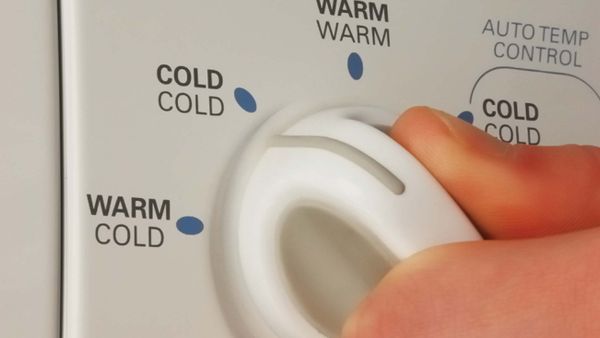When it comes to doing laundry, the temperature of the water you use plays a significant role. Many people wonder whether washing with cold water is as effective as using warm or hot water.
In this blog post, we will explore the pros and cons of washing with cold water, helping you make an informed decision about the best water temperature for your laundry needs. By understanding the benefits and drawbacks, you can optimize your laundry routine while considering factors like energy savings, fabric care, stain removal, and environmental impact.
Table of Contents
Pros of Washing with Cold Water
Energy Savings
One of the significant advantages of washing with cold water is the energy savings it offers. Heating water accounts for a significant portion of the energy used in laundry. By opting for cold water, you can significantly reduce your energy consumption and lower utility bills. This is particularly beneficial for households aiming to be more environmentally friendly and reduce their carbon footprint.
Fabric Care
Cold water is gentler on fabrics compared to hot water. It helps minimize color fading, prevents shrinkage, and reduces the risk of damage or wear to delicate garments. Cold water is especially suitable for items made of wool, silk, or other delicate materials that require more careful handling.
Environmentally Friendly
Washing with cold water contributes to environmental conservation. Since hot water requires energy to heat, using cold water reduces greenhouse gas emissions and conserves natural resources. By making this small change in your laundry routine, you can play a part in protecting the environment.
Versatility
Cold water can be used for a wide range of laundry items, including most everyday clothing and linens. It eliminates the need to separate loads based on color or fabric type, simplifying your laundry process. Using cold water also reduces the risk of color bleeding or transferring between garments.
Stain Removal
While warm or hot water is often preferred for stain removal, cold water can effectively remove many common stains if treated promptly. Cold water is particularly effective for blood, wine, or coffee stains. It’s important to pretreat stains and use appropriate stain removers or detergents designed for cold water use to enhance the stain removal process.
Cons of Washing with Cold Water
Limited Effectiveness on Some Stains
Cold water may not be as effective in removing certain types of stains, such as grease, oil, or heavy soil. These stains often require warm or hot water to break down and dissolve effectively. Consider pre-soaking or pretreating heavily soiled items before washing them in cold water to improve stain removal.
Reduced Bacterial Elimination
Hot water is more effective in killing bacteria and sanitizing laundry items. If you have items that require thorough disinfection, such as diapers, kitchen towels, or heavily soiled clothes, washing them with cold water may not provide the desired level of cleanliness. In such cases, using warm or hot water is recommended.
Potential for Lingering Odors
Cold water may not eliminate strong odors as effectively as hot water. Odors from sweat, body oils, or certain types of stains may linger if not adequately addressed. Using laundry additives specifically designed for odor removal or adding vinegar to the wash cycle can help combat this issue.
Pros and Cons of Washing with Cold Water
| Pros | Cons |
|---|---|
| Energy Savings | Limited Effectiveness on Some Stains |
| Fabric Care | Reduced Bacterial Elimination |
| Environmentally Friendly | Potential for Lingering Odors |
| Versatility | |
| Stain Removal |
Conclusion
Washing with cold water offers several benefits, including energy savings, fabric care, environmental friendliness, versatility, and the ability to remove many common stains effectively. However, it’s important to consider the limitations, such as reduced effectiveness on some stains, decreased bacterial elimination and the potential for lingering odors. By weighing the pros and cons, you can make an informed decision about whether washing with cold water is suitable for your laundry needs.
When opting for cold water, it’s essential to follow some best practices to maximize its effectiveness. Use a high-quality detergent formulated for cold water washing to ensure proper cleaning. Pre-treat stains promptly and consider using stain removers specifically designed for cold water use. To tackle potential odors, consider adding laundry additives or using vinegar as a natural deodorizer.
For items that require more intensive cleaning or disinfection, such as heavily soiled clothes, bedding, or items contaminated with bacteria or allergens, it is recommended to use warm or hot water to ensure thorough sanitation.
In conclusion, washing with cold water offers energy savings, fabric care benefits, environmental advantages, versatility, and effective stain removal for many common stains. However, it may have limitations in removing certain types of stains, eliminating bacteria, and combating strong odors.
By considering your laundry needs, the types of stains you typically encounter, and your desire to minimize energy consumption, you can make an informed decision on whether washing with cold water is the right choice for your laundry routine. Experiment with different temperatures and techniques to find the optimal balance between effectiveness, efficiency, and environmental consciousness.

